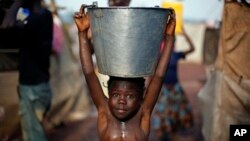The World Food Program says it plans to use both trucks and planes to bring emergency supplies to Central African Republic. Insecurity has reduced food deliveries in recent weeks, forcing the U.N. agency to cut rations to hundreds of thousands of people.
There are 250 trucks waiting at the CAR / Cameroonian border – 43 of them are carrying emergency food for the WFP. But they’ve been there for several weeks. Drivers have been too afraid to make the 600 kilometer trip to the CAR capital Bangui. The road is lined with burned towns and villages and check points manned by armed militias. Muslim and Christian groups have been fighting since early December.
Ten trucks did arrive on January 27th carrying 300 tons of food aid. However, that convoy had an armed escort. WFP spokesman in Bangui, Alexis Masciarelli, said the agency is trying again this week.
“Insecurity is still a very serious concern along that main road between Cameroon and CAR. There’s been a decision to send another armed escort to the border to help bring the truck convoy back in Bangui. From what I understand, the convoy should be reaching the border today with the troops from MISCA – the African intervention force. At the border they will try to organize this convoy.”
If MISCA is successful, it will take a few days for the food to arrive.
“We hope to see that convoy back in Bangui on Thursday at the earliest and most probably on Friday. We don’t know yet how many of our trucks will be arriving. It will be depending on the truck drivers, who are still very much concerned about security along the road,” he said.
But whether or not the trucks arrive this week, the World Food Program has given approval to airlifting supplies to the capital. Masciarelli said the paperwork is being finalized on calls a “massive operation.”
He said, “We hope that within the next few days we’ll be able to start this airlift from Douala in Cameroon here into Bangui for this very costly operation. But it is essential because the food pipeline has been seriously disrupted by the insecurity on the roads. So, we’re hoping to have everyday a plane landing from Douala into Bangui. And over the month of February to have probably a total of two thousand tons of food supplies, mostly cereals to be distributed immediately in the several sites that are hosting hundreds of thousands of displaced people.”
One of the biggest sites is at Bangui airport where about 100-thousand people have sought shelter. About 200-thousand people in all in CAR are receiving emergency food aid. Last month, the WFP cut food rations in half as supplies dwindled.
There are 250 trucks waiting at the CAR / Cameroonian border – 43 of them are carrying emergency food for the WFP. But they’ve been there for several weeks. Drivers have been too afraid to make the 600 kilometer trip to the CAR capital Bangui. The road is lined with burned towns and villages and check points manned by armed militias. Muslim and Christian groups have been fighting since early December.
Ten trucks did arrive on January 27th carrying 300 tons of food aid. However, that convoy had an armed escort. WFP spokesman in Bangui, Alexis Masciarelli, said the agency is trying again this week.
“Insecurity is still a very serious concern along that main road between Cameroon and CAR. There’s been a decision to send another armed escort to the border to help bring the truck convoy back in Bangui. From what I understand, the convoy should be reaching the border today with the troops from MISCA – the African intervention force. At the border they will try to organize this convoy.”
If MISCA is successful, it will take a few days for the food to arrive.
“We hope to see that convoy back in Bangui on Thursday at the earliest and most probably on Friday. We don’t know yet how many of our trucks will be arriving. It will be depending on the truck drivers, who are still very much concerned about security along the road,” he said.
But whether or not the trucks arrive this week, the World Food Program has given approval to airlifting supplies to the capital. Masciarelli said the paperwork is being finalized on calls a “massive operation.”
He said, “We hope that within the next few days we’ll be able to start this airlift from Douala in Cameroon here into Bangui for this very costly operation. But it is essential because the food pipeline has been seriously disrupted by the insecurity on the roads. So, we’re hoping to have everyday a plane landing from Douala into Bangui. And over the month of February to have probably a total of two thousand tons of food supplies, mostly cereals to be distributed immediately in the several sites that are hosting hundreds of thousands of displaced people.”
One of the biggest sites is at Bangui airport where about 100-thousand people have sought shelter. About 200-thousand people in all in CAR are receiving emergency food aid. Last month, the WFP cut food rations in half as supplies dwindled.





